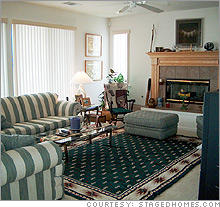|
Profiting from staging Staging a house helps it sell, but who should pay for it? NEW YORK (CNNMoney.com) -- From a non-existent profession a generation or so ago, home stagers have become a force to be reckoned with in the real estate industry. Stagers claim they turn sow's ears into silk purses every day, and make pots of money for their clients. Just what is home staging and what does it involve? And shouldn't the cost of staging come out of the agent's commission rather than the seller's profits?
Barb Schwarz, author of "Home Staging: The Winning Way to Sell your House for More Money," says home staging is gaining adherents daily and it's making serious inroads into what real estate agents used to do. Staging means getting shoppers emotionally involved, according to Schwarz. "Buyers have to be able to mentally picture themselves living in the home," she says. Simple techniques Stagers remove superfluous items and clean things up so the home appeals to the eyes and, importantly, the noses of buyers. "If they can smell it, you can't sell it," says Schwarz. Staging also means removing family photos and most souvenirs and objets d'arts. Your grandma's painted velvet picture of a squirrel on an oak branch? Stow it. "Decorating is personalizing a home, but staging is depersonalizing it," says Schwarz. Before home staging began, in the early 1970s, most real estate agents thought showing houses vacant was best. But Schwarz thought empty rooms looked small and cold; she started to put a few pieces of furniture in to make them more welcoming. "Every room should have two things," says Schwarz, "grounded furniture and leggy furniture. If it's all grounded, like sofas with upholstery that extends to the floor, it sinks the room. If it's all leggy, like tables, the room floats." Another technique she exploits is what she calls the "magic of three," assembling furnishings and decorations in "vignettes" containing three objects, one tall, one medium and one short. "It's a very powerful technique," she says. "On an end table put a lamp, an ivy plant and a book in a triangle form. People respond without knowing why." Do the same for an entire room with a table, chair and ficus plant. In the front yard do it with a groundcover, a shrub and a tree. In her view, house hunting has more to do with emotions than with logic and reason. "What do people say when they look at a house?" she asks. "They say, 'It feels right' or 'It gives me a bad feeling.'" Some sellers resist suggestions that they stage their homes, not wanting to spring for the extra cash. They figure that buyers will overlook shortcomings and visualize what the space will look like when they have their own furnishings moved in. Not true, according to Schwarz. Few shoppers will get beyond their first impressions. "Buyers only buy what they see, not what it's going to be," she says. Changing the industry Schwarz says, "When staging began agents started to think, 'Maybe I should get this vacant house listing of mine staged.' Later, they started thinking that even some houses still lived in would benefit from a professional staging. Today, some agents will not have any unstaged listings." It's even become a selling point for agents prospecting for listings. If they can differentiate themselves during a sales pitch by letting sellers know that their house will be staged, the agent may win the listing. "One seller sued the agent for not recommending the house be staged," says Schwarz. "A nearly identical house down the street sold for $100,000 more - same size lot, same floor plan." Some agents will pay to stage a home, usually crediting the seller at closing. Eventually, though, as staging becomes more popular and takes over more of the agent's functions, sellers may begin to question why they're paying the entire 6 percent commission to their agent when the staging does most of the marketing job. "We know the commission is not just to get a buyer but also to keep the deal closed. Still, if the agent doesn't have to do as much marketing - which they don't when a house is staged - the public will demand that the stager become part of the commission structure."
|
|




